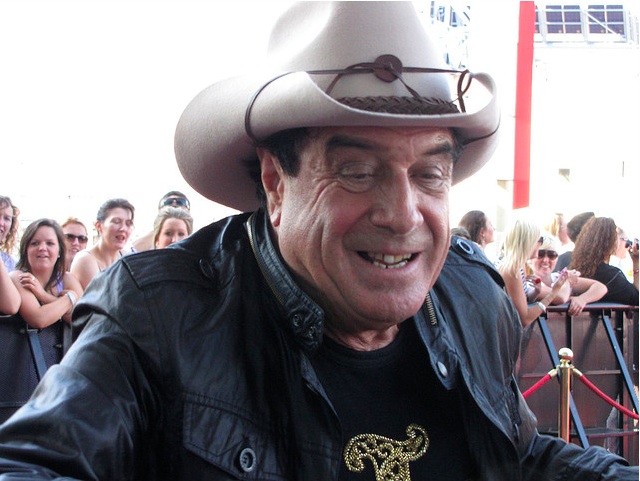|
Ronnie Burns (Australian)
Ronald Leslie Burns Order of Australia, AM (born 8 September 1946) is an Australian retired rock singer-songwriter and musician. He fronted the Melbourne band "The Flies" in the early 1960s, followed by a solo career into the 1970s and was a member of Burns Cotton & Morris in the 1990s. He retired from performing in 2000. His solo hit single, "Smiley" peaked at number two on the ''Go-Set'' National Top 40 in 1970. On 10 June 2013 Burns was awarded a Member of the Order of Australia with the citation "For significant service to the community, particularly to children recovering from illness and trauma, and to the entertainment industry". Early years and The Flies Born on 8 September 1946, Burns was raised in Elwood, Melbourne, Victoria. His father was a butcher, his mother Edna was a fan of vaudeville and his brother Frank, who is five years older, was a drummer. To buy his first guitar for 10 shillings, Burns had part-time jobs selling newspapers, working in a milk ... [...More Info...] [...Related Items...] OR: [Wikipedia] [Google] [Baidu] |
Melbourne
Melbourne ( ; Boonwurrung/ Woiwurrung: ''Narrm'' or ''Naarm'') is the capital and most populous city of the Australian state of Victoria, and the second-most populous city in both Australia and Oceania. Its name generally refers to a metropolitan area known as Greater Melbourne, comprising an urban agglomeration of 31 local municipalities, although the name is also used specifically for the local municipality of City of Melbourne based around its central business area. The metropolis occupies much of the northern and eastern coastlines of Port Phillip Bay and spreads into the Mornington Peninsula, part of West Gippsland, as well as the hinterlands towards the Yarra Valley, the Dandenong and Macedon Ranges. It has a population over 5 million (19% of the population of Australia, as per 2021 census), mostly residing to the east side of the city centre, and its inhabitants are commonly referred to as "Melburnians". The area of Melbourne has been home to Abori ... [...More Info...] [...Related Items...] OR: [Wikipedia] [Google] [Baidu] |
Ian Meldrum
Ian Alexander "Molly" Meldrum AM (born 29 January 1943) is an Australian music critic, journalist, record producer and musical entrepreneur. He was the talent co-ordinator, on-air interviewer, and music news presenter on the former popular music program ''Countdown'' (1974–87) and is widely recognised for his trademark Stetson hat, which he has regularly worn in public since the 1980s (it is commonly mistaken for an Akubra). Meldrum has featured on the Australian music scene since the mid-1960s, first with his writing for ''Go-Set'' (1966–74), a weekly teen newspaper, then during his tenure with ''Countdown'' and subsequent media contributions. As a record producer he worked on top ten hits for Russell Morris (" The Real Thing", "Part Three into Paper Walls", both 1969), Ronnie Burns ("Smiley", 1970), Colleen Hewett (" Day by Day", 1971), Supernaut ("I Like It Both Ways", 1976) and The Ferrets ("Don't Fall in Love", 1977). Meldrum hosted Oz for Africa in July 1985, ... [...More Info...] [...Related Items...] OR: [Wikipedia] [Google] [Baidu] |
Johnny Young
Johnny Young (born Johnny Benjamin de Jong; 12 March 1947) is a Dutch Australian singer, composer, record producer, disc jockey, television producer and host. Originally from Rotterdam, The Netherlands, his family settled in Perth in the early 1950s. Young was a 1960s pop singer and had a number-one hit with the double-A-sided, "Step Back" and a cover of the Strangeloves' "Cara-lyn" in 1966. Young's profile was enhanced by a concurrent stint as host of TV pop music program '' The Go!! Show''. Also in the mid-1960s, Young toured with the Rolling Stones and supported Roy Orbison. As a composer, he penned number-one hits, " The Real Thing" and "The Girl That I Love" for Russell Morris, "The Star" for Ross D. Wyllie and "I Thank You" for Lionel Rose. He also wrote a number-two single, "Smiley" for Ronnie Burns. He presented and produced the TV show, '' Young Talent Time'', which screened on Network Ten from 1971 to 1988. It launched the careers of teen pop stars and theatre ... [...More Info...] [...Related Items...] OR: [Wikipedia] [Google] [Baidu] |
Normie Rowe
Norman John Rowe (born 1 February 1947) is an Australian singer and songwriter of pop music and an actor of theatre and soap opera for which he remains best known as Douglas Fletcher in 1980s serial '' Sons and Daughters''. As a singer he was credited for his bright and edgy tenor voice and dynamic stage presence. Many of Rowe's most successful recordings were produced by Nat Kipner and later by Pat Aulton, house producers for the Sunshine Records label. Backed by his band, The Playboys, Rowe released a string of Australian pop hits on the label that kept him at the top of the Australian charts and made him the most popular solo performer of the mid-1960s. Rowe's double-sided hit the A-side, a reworking of the Doris Day hit " Que Sera Sera" /with b-side a cover of Johnny Kidd & the Pirates " Shakin' All Over" was one of the most successful Australian singles of the 1960s. Between 1965 and 1967 Rowe was Australia's most popular male star but his career was cut short when he ... [...More Info...] [...Related Items...] OR: [Wikipedia] [Google] [Baidu] |
Australian Pop Music Awards
Australian pop music awards are a series of inter-related national awards that gave recognition to popular musical artists and have included the ''Go-Set'' pop poll (1966–1972); '' TV Week'' King of Pop Awards (1967–1978); ''TV Week'' and '' Countdown'' Music Awards (1979–1980); the ''Countdown'' Awards (1981–1982) and ''Countdown'' Music and Video Awards (1983–1987). Early awards were based on popular voting from readers of teenage pop music newspaper ''Go-Set'' and television program guide ''TV Week''. They were followed by responses from viewers of ''Countdown'', a TV pop music series (1974–1987) on national broadcaster Australian Broadcasting Corporation (ABC). Some of the later award ceremonies incorporated listed nominees and peer-voted awards. From 1987 the Australian Recording Industry Association (ARIA) instituted its own peer-voted ARIA Music Awards. 1966–1972:''Go-Set'' pop poll results Teen-oriented pop music newspaper, ''Go-Set'' was established in ... [...More Info...] [...Related Items...] OR: [Wikipedia] [Google] [Baidu] |
Peter Nicoll
Peter may refer to: People * List of people named Peter, a list of people and fictional characters with the given name * Peter (given name) ** Saint Peter (died 60s), apostle of Jesus, leader of the early Christian Church * Peter (surname), a surname (including a list of people with the name) Culture * Peter (actor) (born 1952), stage name Shinnosuke Ikehata, Japanese dancer and actor * ''Peter'' (album), a 1993 EP by Canadian band Eric's Trip * ''Peter'' (1934 film), a 1934 film directed by Henry Koster * ''Peter'' (2021 film), Marathi language film * "Peter" (''Fringe'' episode), an episode of the television series ''Fringe'' * ''Peter'' (novel), a 1908 book by Francis Hopkinson Smith * "Peter" (short story), an 1892 short story by Willa Cather Animals * Peter, the Lord's cat, cat at Lord's Cricket Ground in London * Peter (chief mouser), Chief Mouser between 1929 and 1946 * Peter II (cat), Chief Mouser between 1946 and 1947 * Peter III (cat), Chief Mouser between 1947 ... [...More Info...] [...Related Items...] OR: [Wikipedia] [Google] [Baidu] |
Billy Thorpe & The Aztecs
Billy Thorpe and the Aztecs were an Australian rock band formed in Sydney, New South Wales. The group enjoyed success in the mid-1960s, but split in 1967. They re-emerged in the early 1970s to become one of the most popular Australian hard-rock bands of the period. Thorpe died from a heart attack in Sydney on 28 February 2007. History 1963–1968: Beginning Originally a four-piece instrumental group called The Vibratones’ who had released a Surf instrumental single, "Expressway" b/w “Man of Mystery”, they formed in Sydney in 1963. With the advent of the Merseybeat sound, they added a lead singer, Billy Thorpe. His powerful voice and showmanship (which made him one of the most popular and respected rock performers in Australian music), completed the original line-up, which consisted of drummer Col Baigent, bassist John "Bluey" Watson and guitarists Brian Bakewell and Vince Maloney (who as Vince Melouney, later became a member of The Bee Gees). Brian Bakewell left the ba ... [...More Info...] [...Related Items...] OR: [Wikipedia] [Google] [Baidu] |
ABC Television (Australian TV Network)
ABC Television is the general name for the national television services of the Australian Broadcasting Corporation (ABC). Until an organisational restructure in 2017/2018, ABC Television was also the name of a division of the ABC. The name was also used to refer to the first and for many years the only national ABC channel, before it was renamed ABC1 and then again to ABC TV. The Australian public broadcaster's television service was launched in November 1956 from its first television station in Australia, ABN Sydney. This was the second one in the country, with the commercial channel TCN having launched two months earlier. An ABC television network covering every state and territory was completed by 1971, and in 2000 the television operations joined the ABC radio and online divisions at the Corporation's Ultimo headquarters in Sydney in 2000. The ABC provides five non-commercial channels within Australia, headed by its flagship ABC TV channel, as well as ABC Austra ... [...More Info...] [...Related Items...] OR: [Wikipedia] [Google] [Baidu] |
Signature Song
A signature (; from la, signare, "to sign") is a Handwriting, handwritten (and often Stylization, stylized) depiction of someone's name, nickname, or even a simple "X" or other mark that a person writes on documents as a proof of identity and intent. The writer of a signature is a signatory or signer. Similar to a handwritten signature, a signature work describes the work as readily identifying its creator. A signature may be confused with an autograph, which is chiefly an artistic signature. This can lead to confusion when people have both an autograph and signature and as such some people in the public eye keep their signatures private whilst fully publishing their autograph. Function and types The traditional function of a signature is to permanently affix to a document a person's uniquely personal, undeniable self-identification as physical evidence of that person's personal witness and certification of the content of all, or a specified part, of the document. For examp ... [...More Info...] [...Related Items...] OR: [Wikipedia] [Google] [Baidu] |
Roy Orbison
Roy Kelton Orbison (April 23, 1936 – December 6, 1988) was an American singer, songwriter, and musician known for his impassioned singing style, complex song structures, and dark, emotional ballads. His music was described by critics as operatic, earning him the nicknames "The Caruso of Rock" and "The Big O." Many of Orbison's songs conveyed vulnerability at a time when most male rock-and-roll performers chose to project machismo. He performed while standing motionless and wearing black clothes to match his dyed black hair and dark sunglasses, which he wore to counter his shyness and stage fright. Born in Texas, Orbison began singing in a rockabilly and country-and-western band as a teenager. He was signed by Sam Phillips of Sun Records in 1956, but enjoyed his greatest success with Monument Records. From 1960 to 1966, 22 of Orbison's singles reached the ''Billboard'' Top 40. He wrote or co-wrote almost all of his own Top 10 hits, including " Only the Lonely" (1960 ... [...More Info...] [...Related Items...] OR: [Wikipedia] [Google] [Baidu] |
The Rolling Stones
The Rolling Stones are an English rock band formed in London in 1962. Active for six decades, they are one of the most popular and enduring bands of the rock era. In the early 1960s, the Rolling Stones pioneered the gritty, rhythmically driven sound that came to define hard rock. Their first stable line-up consisted of vocalist Mick Jagger, multi-instrumentalist Brian Jones, guitarist Keith Richards, bassist Bill Wyman, and drummer Charlie Watts. During their formative years, Jones was the primary leader: he assembled the band, named it, and drove their sound and image. After Andrew Loog Oldham became the group's manager in 1963, he encouraged them to write their own songs. Jagger and Richards became the primary creative force behind the band, alienating Jones, who had developed a drug addiction that interfered with his ability to contribute meaningfully. Rooted in blues and early rock and roll, the Rolling Stones started out playing covers and were at the forefron ... [...More Info...] [...Related Items...] OR: [Wikipedia] [Google] [Baidu] |
Lynne Randell
Lynne Randell (born Lynne Randall, 14 December 1949 – 8 June 2007) was an English Australian pop singer. For three years in the mid-1960s, she was Australia's most popular female performer and had hits with "Heart" and " Goin' Out of My Head" in 1966, and " Ciao Baby" in 1967. In 1967, Randell toured the United States with The Monkees and performed on-stage with support act Jimi Hendrix. She wrote for teen magazine, ''Go-Set'', and television programme guide, ''TV Week''. While on the US tour, Randell became addicted to methamphetamine, an addiction which she battled for most of her life. Early life Lynne Randell was born as Lynne Randall in Liverpool, England, in 1949 and had started primary school. When five years old, her family migrated to Australia and settled in the Melbourne suburb of Murrumbeena. She later attended Mordialloc High School. She completed Form Three and won a talent quest at a school fete – the prize was a one-week engagement at Lorne on the Victoria ... [...More Info...] [...Related Items...] OR: [Wikipedia] [Google] [Baidu] |




.png)
